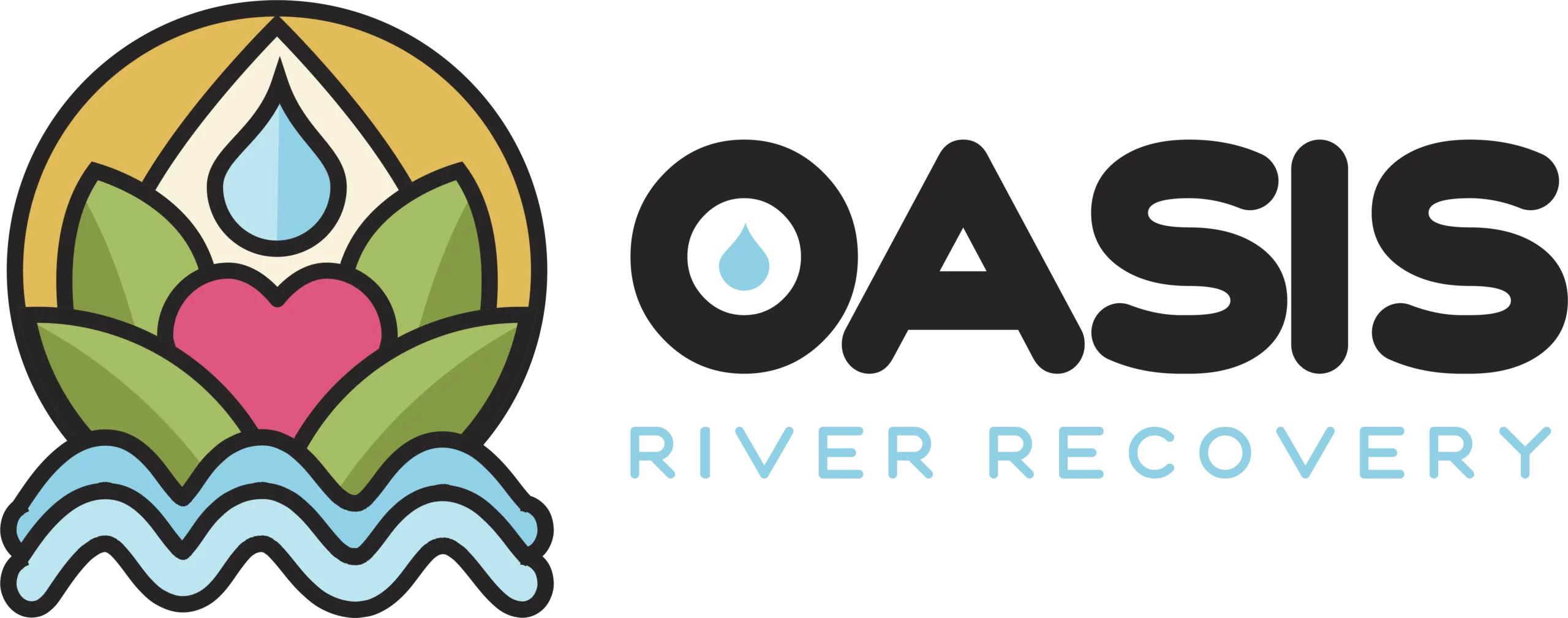Many people who are living with alcohol use disorder have a hard time recognizing or accepting they have a problem with drinking. There are several reasons for this behavior. By understanding why your loved one has a difficult time admitting they have a problem, you’ll learn how to help an alcoholic in denial come to terms with the severity of their condition. You’ll also be able to point them to the right treatment methods.
Note: The term “alcoholic” is used in this article for descriptive purposes only. Therapists and clinicians in the field do not use or encourage the use of the terms “alcoholic” or “addict.” People are not the sum of their actions, and Oasis River Recovery doesn’t label them as such.
Alcohol Abuse and Denial
Individuals struggling with alcohol abuse typically consume more alcohol than intended and continue to do so, even when it harms their health and those they love. Denial is a defense mechanism people resort to when they try to avoid facing reality.
Someone who doesn’t believe they have a drinking problem is often unaware of their denial. Unfortunately, denial is a common component of alcohol abuse and usually appears on a spectrum. While some people know and acknowledge the situation, others don’t see a problem with their behavior. Denial is also one of the main reasons why some people who struggle with alcohol abuse refuse to seek treatment.

Connect With Us Now
Reach out to us now for immediate support, or let us know the best time to contact you through our confidential callback service. Your journey to healing is just a conversation away.
Common Defenses For Alcohol Abuse
#1 Lying About Consumption
Sometimes, the urge to drink is so strong they continuously lie about their alcohol use. Lying helps them avoid getting scolded by their friends, spouses, and families. They might sneak drinks during events or parties when no one is looking or drinking before attending a social function.
#2 Blaming Other People
Many who abuse alcohol refuse to take responsibility for their actions while blaming their drinking on everyone else. They may tell their spouse they only planned to have one drink at the bar, but their friends made them drink more than they wanted. Blaming others makes it easier for them to rationalize their drinking habits without confronting the truth.
Sometimes, family members can directly and indirectly enable alcoholism, and their loved ones can use this as an excuse for their alcohol abuse.
#3 Comparing Their Use With Others
It’s easier to justify drinking when you compare your situation to others whose own alcohol use is worse than your own. A person may use this logic to say their drinking “isn’t too bad” when compared to someone else who drinks much more than they do. This type of thinking is also known as “terminal uniqueness.”
#4 Rationalizing Why They Drink
Those who abuse alcohol often “compromise” with others, saying they’ll only stick to one or two drinks a week. They might also say, “I’ll only drink when I have a stressful day at work,” or ” I’ll only have a beer on the weekends with friends.”
#5 Dismissing the Problem
When someone with an alcohol use disorder becomes dismissive, it’s because they are trying to shut down a conversation about their drinking before it starts. They may say their drinking isn’t a big deal and you shouldn’t worry about it. If you continue trying to talk to them, they may accuse you of nagging and leave the conversation altogether.
#6 False Agreements and Anger
Sometimes, it’s easier for your loved one to agree with your concerns to appease you temporarily and don’t make a real effort to cut back or stop completely. During a night of drinking, they may claim they are having their last drink, only to refill their glass after finishing. If angry, they may say, “It’s not your business. It’s my body and my life.” This can be hard for families to witness, and eventually, the mental health side effects of their drinking expand to those around them.
Take Our Addiction Quiz For Recovery Insights
Why Do People Who Abuse Alcohol Deny They Have a Problem?
Many people with an alcohol use disorder already know they have a problem but don’t want to admit it. There are several reasons why it’s difficult for them to admit their struggle with alcohol. As alcohol begins to cause significant problems in their life, denial becomes their primary and only defense mechanism. Other reasons why they might deny their situation is out of control include:
Shame: Someone who grew up with an alcoholic parent or relative may feel ashamed they are now drinking heavily, too.
Societal views: Drinking alcohol is normalized in many societies, making it easier for people to rationalize how much they consume.
Lack of education – Some people who drink excessively do not understand how harmful alcohol is.
Neurological issues – If someone continues to drink heavily over time, significant neurological changes can occur in the brain, affecting self-awareness and insight.
Enabling Alcohol Abuse
As alcohol dependence worsens, friends and family often become enablers, which contributes to their denial. Sometimes, those who are closest to a person with an addiction will do everything they can to keep them out of trouble. They might make excuses for their behavior and even enable them to continue drinking. For example, you may agree to drive to the liquor store because they are too drunk to drive or call their workplace for them and say they’re too ill to come in when they’re hungover.

How To Help an Alcoholic In Denial
Any signs of alcohol abuse are a cause for concern. The first thing you must do is stop enabling their behavior. Talk to them openly and try to refrain from judgment. Tell them how much you care about their health and well-being. Practice empathy and try to see things from their perspective.
Ask your loved one to reflect on their drinking patterns using open-ended questions. They may start to see how their drinking has negatively affected their life and realize the extent of their problem. If they can move past denial and admit they need help, guide them to the appropriate resources so they can work towards getting sober. Finally, take care of yourself. Alcohol use disorders affect more than just one person, which is why it’s often called a “family disease.” So, practice healthy self-care and consider seeking professional help for yourself, too.
Medical Alcohol Detox
Rehabilitation for alcoholism usually starts with an admission into medical detox. Depending on the severity of addiction, alcohol withdrawal symptoms range from mild to severe. While some may experience nausea and insomnia, others can suffer from severe symptoms like seizures and dangerously high blood pressure. Medical detox usually lasts several days and allows you to relax while your body adjusts to no longer having alcohol in its system while under the care of medical staff. Your time in detox also provides for a smooth transition into the treatment program while staying away from potential triggers.
Check out our partnered residential addiction treatment and medical detox program in Knoxville, TN.
Individual Therapy
Alcohol addiction is usually a coping mechanism for underlying emotional and behavioral challenges. Individual therapy is pivotal to successful recovery because it provides you with a safe and supportive space to process your emotions, develop healthy coping mechanisms, and identify triggers. Everyone’s needs are different. However, individual therapy allows you to talk about the root causes of your alcohol use while focusing on changing negative thought patterns.
Group Therapy
Addiction is an isolating disease, which is why group therapy is beneficial for most people in recovery. Group therapy strengthens your communication and relationship skills while you find your voice in the process. You’ll work towards self-acceptance and share experiences and emotions with other group members while learning from each other.
Adventure Therapy
Adventure therapy connects mental and physical health while promoting self-healing. Activities like rafting and rock climbing help individuals gain a higher self-awareness by exploring the world around them. This kind of therapy boosts self-esteem and allows you to practice problem-solving skills while working with others as a team.
Therapeutic Art Sessions
Holistic approaches such as art therapy are an effective way to help individuals process past traumatic experiences. You can delve into your personal history and unresolved emotional pain by expressing yourself creatively. Art therapy teaches you to form positive outlooks and communicate feelings through painting, drawing, and clay work.
Accelerated Resolution Therapy
Sometimes, addiction stems from previous traumas and painful memories. Accelerated resolution therapy helps individuals process these memories by recognizing the emotions and physical sensations they create and combining them with more relaxing visualization through repetitive eye movements. This therapeutic intervention allows you to process traumatic events, which will aid in your treatment.
Person-Centered Therapy
A lot of people can doubt their ability to recover from alcohol abuse. Person-centered therapy helps individuals explore their own identities and accept themselves for who they are. During each session, you will work with a therapist to facilitate self-discovery while building a solid connection and identifying strategies to incorporate into your aftercare action plan.
Experiential and Holistic Therapies
Holistic therapeutic techniques address the mind-body-spirit connection and are valuable components in addiction recovery. You’ll be able to explore alternative outlets for emotional expression using creativity and hands-on experiences. These activities benefit dual-diagnosis individuals and those with difficulty expressing their emotions but enjoy being creative and participating in outdoor activities. Adventure and art therapy are components of experiential therapy, breathwork, and other activities.
Are You Covered For Treatment?
Oasis River Recovery partners with numerous private insurance providers. Our team is committed to assisting you in quickly and effortlessly verifying your insurance coverage for treatment.
Alcohol Addiction Treatment Through Holistic Healing Near Chattanooga, TN
If you or someone you know is struggling with alcohol abuse and is in denial, contact Oasis River Recovery in Ocoee, TN. Just outside Chattanooga, our treatment center is off the banks of the Ocoee River and focuses on experiential and holistic healing approaches to alcohol addiction. The opposite of addiction is connection, and our adventure therapy program is the perfect opportunity to connect with nature and yourself. Call, email, or fill out a form today to get started.
If our program isn’t right for you, we can connect you with one of our five partnered treatment centers offering residential treatment, intensive outpatient treatment, medical detox, and more.



